we heart it animals cute
Who Sleeps More: You or These Adorable Animals?
According to the National Sleep Foundation, the average human adult needs 7-9 hours of sleep every night. How do our sleep habits compare to these infinitely cuter mammals?
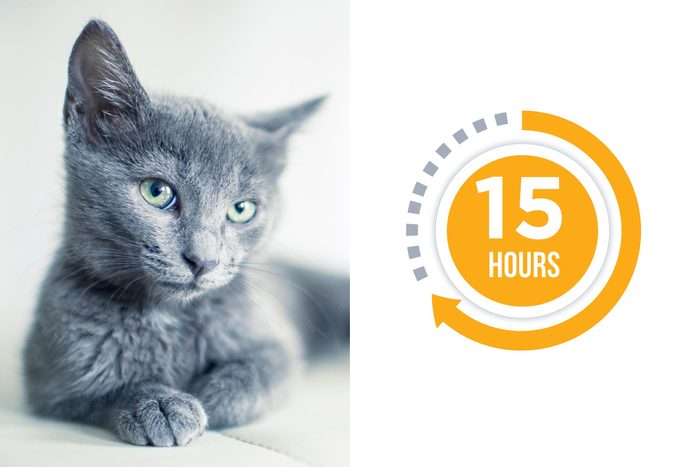 Nicole Fornabaio/Rd.com, iStock
Nicole Fornabaio/Rd.com, iStock
Cats—15 hours
On average, cats spend around 15 hours a day sleeping, and they do not want to be disturbed when they snooze (Here are 16 other things you cat wants to tell you.) But every cat is different. Those sleep times can range from 12 to 16 hours. Large wild cats also snooze most of the day away. Male lions may even sleep a full 24 hours after a large meal.
 Nicole Fornabaio/Rd.com, iStock
Nicole Fornabaio/Rd.com, iStock
Hedgehogs—10 hours
Hedgehogs typically get 10 hours of sleep every day, and since they're nocturnal, they have opposite sleeping schedules from humans. Hedgehog owners can wake up their pets to play during the day, but the little guys usually get grumpy and curl up into a ball. Check out these photos of these cute hedgehog pictures if you need a smile!
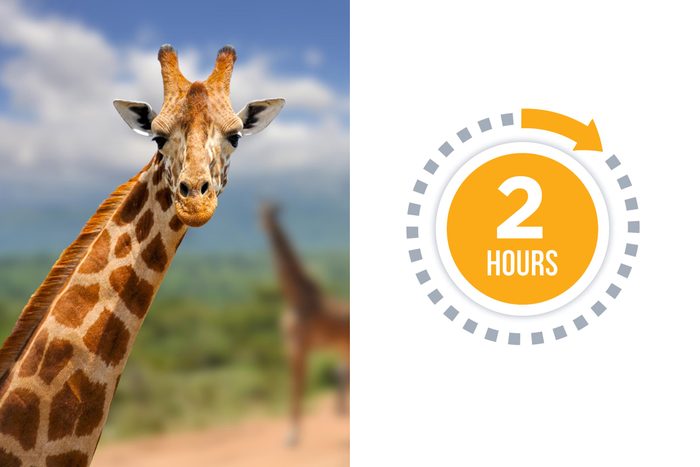 Nicole Fornabaio/Rd.com, iStock
Nicole Fornabaio/Rd.com, iStock
Giraffe—about 2 hours
There's debate about how long giraffes actually sleep, but it's between one and five hours a day. They can sleep standing up with their necks down and heads resting on their back. Like humans, they have an REM (Rapid Eye Movement) cycle, but in order to reach that, they need to lie down with their legs tucked under their bodies. (Read more about the four stages of sleep and why they matter.)
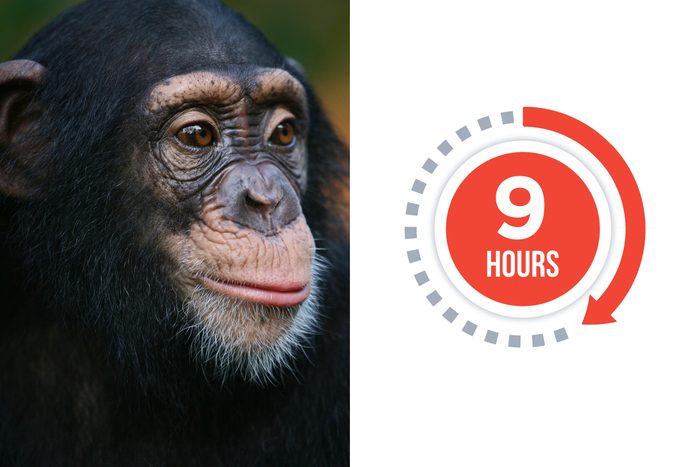 Nicole Fornabaio/Rd.com, iStock
Nicole Fornabaio/Rd.com, iStock
Chimpanzees—9 hours
Chimpanzees sleep between eight and nine hours in their nests, located high up in tree canopies, and they're very picky about finding the best materials for those nests. An eye-opening 2014 study found that 70 percent of chimps in a Ugandan wildlife reserve used branches from the same tree—sturdy Ugandan ironwood—even though that species made up less than 10 percent of the trees in that area.
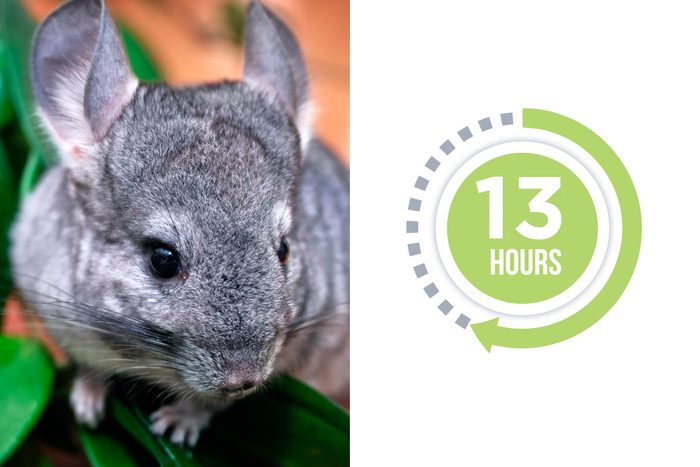 Nicole Fornabaio/Rd.com, iStock
Nicole Fornabaio/Rd.com, iStock
Chinchillas—13 hours
Chinchillas are nocturnal, but don't be surprised if they look awake during the day. They sleep with their eyes open. They're also known to be light sleepers. In the wild, chinchillas sleep in crevices or burrows so predators don't spot them.
 Nicole Fornabaio/Rd.com, iStock
Nicole Fornabaio/Rd.com, iStock
Sheep—4 hours
Sheep typically spend about 15 percent of their day sleeping, which adds up to less than four hours. Their odd sleep habits probably came from their ancestors that needed to stay awake to avoid getting attacked by predators.
 Nicole Fornabaio/Rd.com, iStock
Nicole Fornabaio/Rd.com, iStock
Rabbits—8 hours
Rabbits sleep around eight hours. Although they mostly sleep during the day, they're not nocturnal either. They're crepuscular, which means they're most active at dusk and dawn. These are the best times for them to find food since it's hard for predators to spot them in the low light. Wild rabbits even have special places for sleeping in the tunnels they live in underground, also called warrens.
 Nicole Fornabaio/Rd.com, iStock
Nicole Fornabaio/Rd.com, iStock
Horses—3 hours
Like sheep, horses evolved from a species that was preyed on in open fields, so they don't need much time to sleep either. This is also why they sleep standing up, even though scientists may believe horses need to lie down to enter a deep sleep. (Check out our funny horse jokes.)
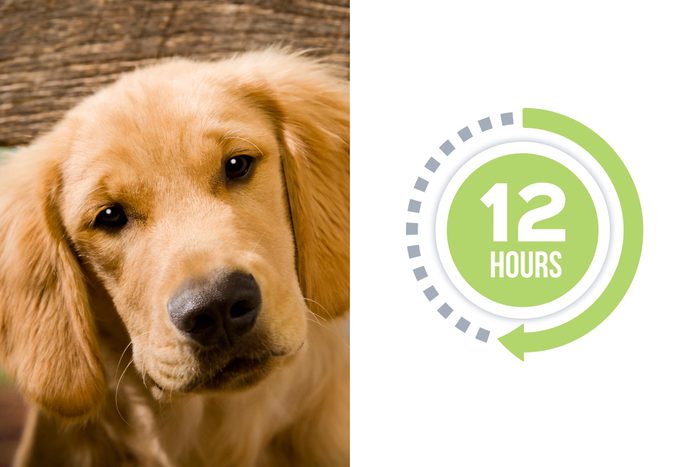 Nicole Fornabaio/Rd.com, iStock
Nicole Fornabaio/Rd.com, iStock
Dogs—Between 12 and 14 hours
Dogs can sleep anywhere from 10-14 hours, although 12-14 is considered average for adult dogs. Puppies can need as much as 18-20 hours of sleep because they use so much energy running around all day. Canine sleep habits vary between breeds, but any dog that seems to sleep all the time may need a trip to the vet. (Don't expect your vet to tell you these 50 secrets.)
 Nicole Fornabaio/Rd.com, iStock
Nicole Fornabaio/Rd.com, iStock
Squirrel—15 hours
Nighttime habits differ for different types of squirrels (who, by the way, are probably smarter than you). Tree squirrels sleep in dens in the side of trees, while ground squirrels dig theirs underground. When ground squirrels hibernate in the winter, they are only awake for 12 to 20 hours each week.
 Nicole Fornabaio/Rd.com, iStock
Nicole Fornabaio/Rd.com, iStock
Seals—6 hours
As creatures of land and sea, seals can sleep pretty much anywhere in their habitat. Rocks and beaches often serve as seal beds, but they are also able to sleep floating upright and even underwater. A study from the University of Alaska-Fairbanks found that while elephant seals sleep, they let themselves sink in a way that resembles leaves falling from a tree. One possible explanation? They sleep with half of their brains awake. (Check out the incredible story of one elephant seal who saved a man's life.)
 Nicole Fornabaio/Rd.com, iStock
Nicole Fornabaio/Rd.com, iStock
Elephants—4 hours
In total, elephants sleep about four to five hours during a 24-hour period, but their bedtime is actually split into chunks throughout the day. They can sleep lying down or resting against tree trunks and termite mounds. Elephants in herds take turns sleeping while the others keep watch for trouble. Need more animal cuties in your life? These pictures of baby wild animals will instantly brighten your day.
Originally Published: February 03, 2017
Sign up for articles sent right to your inbox
Enjoy the best stories, advice & jokes delivered right to your inbox!

Subscribe & SAVE Save Up To 84%!
Source: https://www.rd.com/list/how-long-animals-sleep/